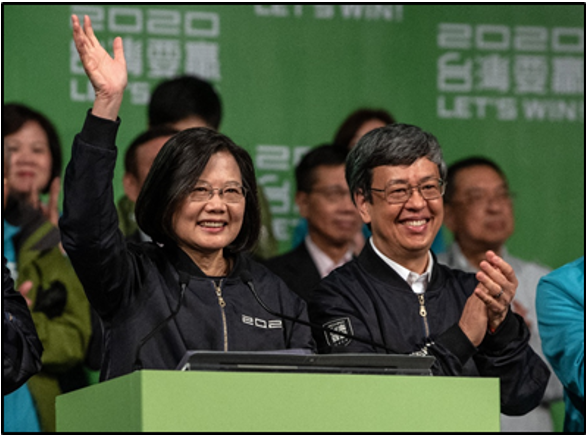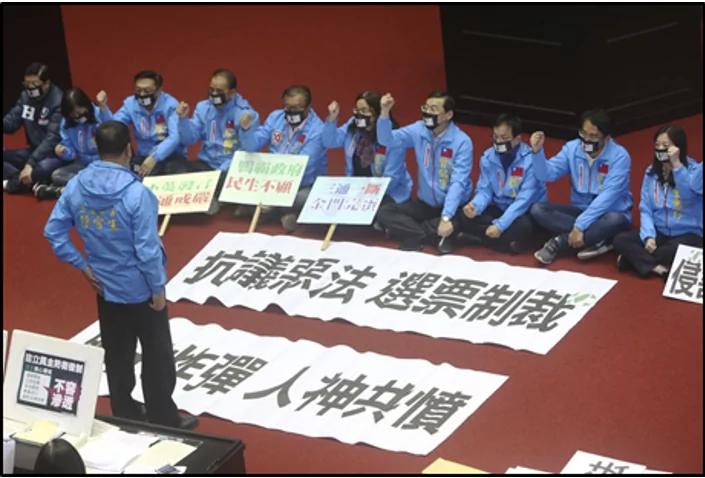
Beijing Piles More Pressure on Taiwan after a Historic Victory by Tsai Ing-Wen
Publication: China Brief Volume: 20 Issue: 1
By:

Introduction
How will Beijing react to Taiwan President Tsai Ing-wen’s resounding re-election victory on January 11, when she garnered a historic 8 million votes, or 57.13 percent of the electorate? So far, Beijing’s response to this triumph by the candidate of the theoretically pro-independence Democratic Progressive Party (DPP) has been relatively non-belligerent. The spokesman of the cabinet-level Taiwan Affairs Office said a few hours after the polls that Beijing would “insist on the basic objective of ‘peaceful unification and one country, two systems’,” even though he also indicated that Beijing would not tolerate “any form of ‘Taiwan independence’.” Another post-election commentary by the official Xinhua News Agency said that “the mainland firmly holds the initiative in bilateral relations.” In an article in the usually hawkish Global Times, Editor-in-Chief Hu Xijin said Chinese society was “prepared for war with Taiwan independence,” but that it was not yet ready for “immediate warfare” (Xinhua, January 12; Phoenix TV News, January 12; Global Times, January 11; South China Morning Post, January 11).
Observers of Taiwan Strait dynamics have noted that Chinese Communist Party (CCP) General Secretary Xi Jinping, the highest-ranking decision-maker on Taiwan issues, was bitterly unhappy about the margin of Tsai’s victory; and that the commander-in-chief will likely order a series of measures to boost “war preparation,” squeeze Taiwan’s diplomatic space, suppress Taiwan’s economy, and nurture the so-called “fifth column” in Taiwan society (Chinatimes.com, January 12; HK01.com, January 11). The fifth column is a reference to Taiwanese politicians and businesspeople who, while professing to defend their island against Communist aggression, are proposing more communication and even “pro-unification talks” with Beijing as a result of their dependence (financial or otherwise) on the CCP.
Potential Forms of Military and Political Coercion Against Taiwan
The military strategy that the People’s Liberation Army (PLA) might use against Taiwan is relatively simple: the goal is to erect at least a temporary air force and naval blockade so that Taiwan will become isolated from the rest of the world. Coinciding with the election, naval forces of the PLA Eastern War Theatre engaged in a five-day war game involving two state-of-the-art Type 052D-class destroyers (Apple Daily.com, January 13). According to the results of hundreds of computerized simulations of an island invasion, the PLA Navy (PLAN) will need to build at least a few aircraft carrier battle groups in the coming decade or so. Aircraft carriers—together with platforms such as nuclear submarines—are crucial to a successful blockade of the island (Mil.sina.cn, July 29, 2019; Radio French International Chinese Edition, July 29, 2019). There was a tense confrontation last Christmas in the waters off Hainan Island and Taiwan between the aircraft carrier USS Abraham Lincoln and the PLAN’s own carrier Shandong (Ming Pao, January 2). Xi’s advisers seem confident that as the differentials in military strength between both sides narrow, the U.S. Pentagon will think twice about taking on increasingly sophisticated Chinese naval vessels.
A traditional beach-landing on the Taiwan coastline—which might result in thousands upon thousands of casualties, and lead to worldwide condemnation of the CCP—seems unlikely. More probable scenarios would include decapitation of the DPP leadership, followed by pro-Chinese appeasement tactics by a fifth column painstakingly nurtured by the CCP for years (Apple Daily, January 13; Tv.cntv.cn, January 8; Mil.ifeng.com, April 3, 2019). According to one version of a computerized war game, the PLA will use its missile force to decapitate the entire upper echelon of the DPP. The result would be immediate chaos and widespread panic, as there would not be any legal leaders left. At this stage, representatives of the fifth column (who may include Taiwan businesspeople and politicians—some might say characters similar to the defeated Kuomintang presidential candidate Han Kuo-yu) will attempt to take over the political arena. They will try to reassure the public by claiming that Xi Jinping will not invade Taiwan and that the mainland will prop up Taiwan’s economy on condition that Taiwanese jettison the DPP and immediately begin “open and fair” reunification talks with the CCP. [1] This and similar tactics are behind the billion dollars’ worth of preferential economic policies that Beijing showered on Taiwan before the DPP’s Tsai came to power in 2016.
Taiwan’s Resilience and Will to Resist
According to an old dictum of Chairman Mao, the people’s will is the determinant of any major battle. The question for Taiwan is, do Taiwanese have the will to withstand the threats and blandishments from Beijing? Is the fifth column nurtured by Beijing, which consists of powerful politicians (especially from the KMT) and parts of the business elite, already very strong on the island? According to Yan Jian-fa, Vice-President of the Taiwan Foundation for Democracy, “Taiwan has already become the playground for the fifth column” (Tw.appledaily.com, February 19, 2019). For Tung Li-wen, a Professor of Public Security at the Central Police University, the fifth column has become a formidable actor in Taiwan politics. “Sometimes, one requires courage to expose and criticize the CCP,” he said. One example is that the CCP Propaganda Department already controls several influential newspapers and TV stations on the island (Itn.com.tw, January 18, 2019).
For many Taiwan academics and commentators, the massive support that various sectors of Taiwan have shown toward Hong Kong’s recent anti-CCP political campaign demonstrates that Taiwan people have an iron will to counter Beijing’s united front tactics. However, one must not forget the fact that among the tens of thousands of big and small Taiwanese investors in the mainland, their future depends on Beijing’s largesse. Late last month, Tsai passed an “Anti-Infiltration Law” (反渗透法, fan shentou fa) to stop Taiwan businesspeople, commentators and the media from openly praising the CCP and advocating “peaceful talks” with the Communists (Central News Agency, January 1; RTHK.hk, January 1; South China Morning Post, December 31, 2019).

It remains to be seen whether the people’s livelihood issues—particularly improving the living standards of average Taiwanese—will enable Beijing to continue to win hearts and minds in Taiwan. After all, KMT candidate Han, who has been criticized for being pro-Beijing, won more than 5 million votes in the presidential polls. And Han apparently had only one strong point: his ability to appease the CCP and to persuade Beijing to grant preferential business policies to Taiwanese investors, merchants, and traders, as well as farmers and fishermen (BBC Chinese Service, December 31, 2019; Cn.nytimes.com, June 10, 2019). The appeal of suspected fifth columnists like Han must be taken seriously.
Taiwan’s Relations with the United States and Hong Kong
The historic victory of Tsai will likely exacerbate already tense relations between China and the United States. This is despite the fact that the DPP has apparently embraced the American agenda of maintaining the status quo in the Taiwan Strait instead of actively seeking independence. According to Xinhua, Tsai’s triumph was a function of “the control of foreign dark forces” and the “intrusion of Western forces” into the island (Xinhua, January 13). Part of the rationale behind the Tsai administration’s defiance of the CCP was President Donald Trump’s pledge to sell F-16 aircraft and other sophisticated weapons to the island. Quasi-diplomatic ties between the United States and Taiwan have also been elevated in the past year (China Brief, July 31, 2019).
The morning after the election, Tsai met with William Brent Christensen, the President of the American Institute in Taiwan (Washington’s de facto embassy on the island). She indicated that the “Taiwan-U.S. partnership has already grown from a bilateral partnership to a global partnership.” The two quasi-allies have continued “to expand our cooperation across security, the economy, and our shared values based on the foundation of democracy and freedom,” she said (Taiwan Presidential Office, January 12). The subtext of Tsai’s message seems to be that Taiwan would help Washington’s quasi-Cold War policy of “containing” an anti-democratic China. While Phase One of the U.S.-China trade accord was signed on January 15, Phase Two of the trade talks could touch upon issues including the Chinese party-state’s control of the economy, and geopolitical sticking points including Taiwan, Xinjiang and Hong Kong.
The Taiwan elections will also have a sizable impact on relations between Beijing and Hong Kong. Public administration Professor Xiang Cheng-hua of Taiwan’s Culture University is among a large number of observers who believe that the anti-Beijing crusade in Hong Kong over the past year has immensely benefited the Tsai campaign. “The Hong Kong experience has made possible the spiritual mobilization of the DPP,” he told the Taiwan media. “And almost all young voters have been swayed [by the DPP]” (United Daily News, January 11). It is significant that in her acceptance speech on election night, Tsai thanked her “friends in Hong Kong” for support. For President Xi, however, the Hong Kong “rebellion” that has helped Tsai will likely render him more disposed toward a hardline policy on the special administrative region (SAR). After all, Xi and many of his colleagues are convinced that the unpatriotic and intransigent anti-CCP mentality of Hong Kong residents has threatened the viability of “one country two systems” (China Brief, December 10, 2019). Xi has already mapped out plans to promote nationalism in Hong Kong schools, as well as to give more powers to the Hong Kong police to handle protests against Chinese rule (Radio French International Chinese Edition, January 12; Deutsche Welle Chinese Edition, January 12).
Conclusion
Overall, the possibility of the Xi administration admitting that the Tsai victory demonstrated imperfections in Beijing’s Taiwan policy is not high. This is despite the fact that at a recent year-end forum hosted by the Global Times, Wang Zaixi, a former deputy director of the Taiwan Affairs Office, indirectly admitted Beijing’s failure to win large numbers of converts on the island. “Winning over the hearts of the people and doing well in work with the masses was always the Communist Party’s strong suit, our special skill,” Wang said at the forum. “So why has it failed in the face of our Taiwan compatriots? Can you blame them?” Wang noted that Beijing needed to reappraise its “working methods and approach” toward the breakaway island (New York Times Chinese Edition, January 9; Uzbcn.com, December 12, 2019). In early January, Xi fired Wang Zhimin, the Director of Beijing’s Central Liaison Office in Hong Kong—whose position is equivalent to acting as party secretary of the SAR—for mishandling the anti-China protests in the former British colony. It is likely that the Taiwan Affairs Office will witness a reshuffle of top personnel soon. The probability, however, that the super-nationalist Xi will abandon his long-standing policy of trying to vanquish Taiwan by force remains low, given Xi’s poor understanding of the Taiwanese mentality—and the tradition that a top CCP leader must be seen to be tough to preserve his “core” status in the party.
Dr. Willy Wo-Lap Lam is a Senior Fellow at The Jamestown Foundation and a regular contributor to China Brief. He is an Adjunct Professor at the Center for China Studies, the History Department, and the Master’s Program in Global Political Economy at the Chinese University of Hong Kong. He is the author of five books on China, including Chinese Politics in the Era of Xi Jinping (2015). His latest book, The Fight for China’s Future, was released by Routledge Publishing in July 2019.
Notes
[1] Author’s interview with four sources with the rank of government bureau head or above, who are knowledgeable about the Taiwan Strait crisis.




